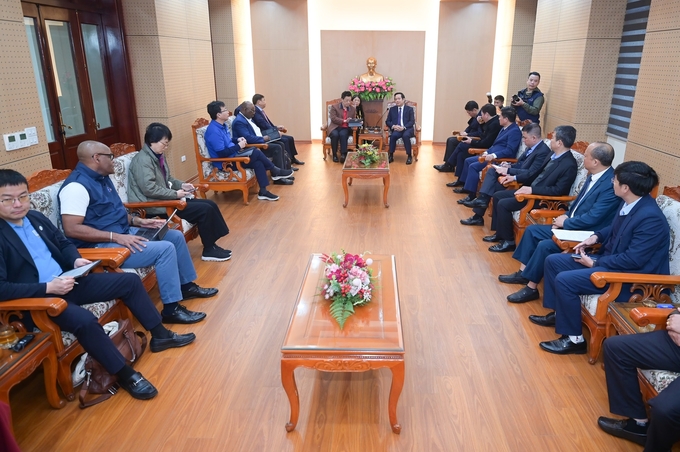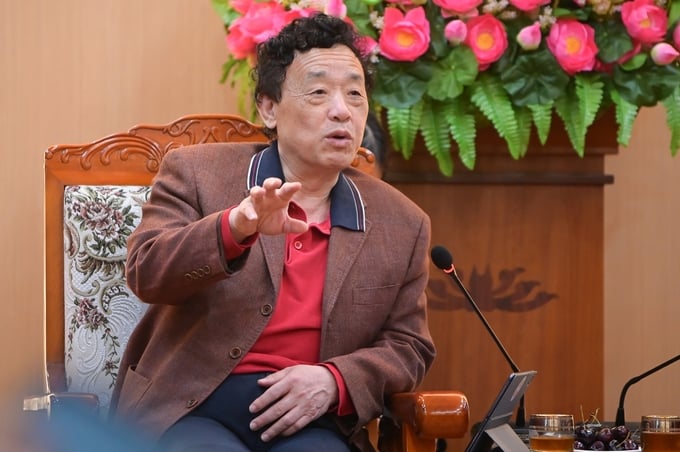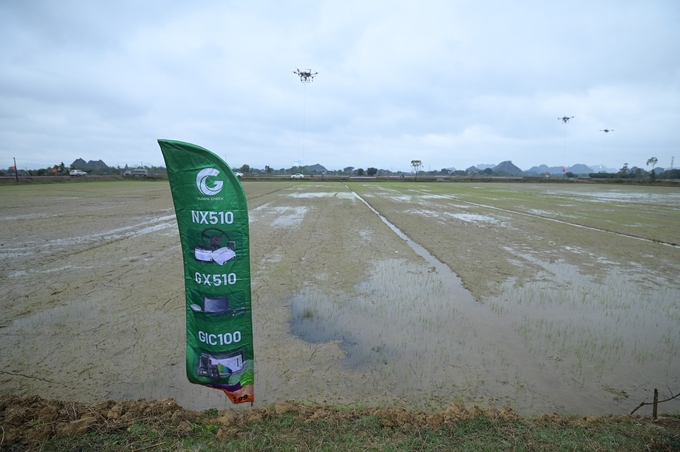November 23, 2025 | 11:08 GMT +7
November 23, 2025 | 11:08 GMT +7
Hotline: 0913.378.918
November 23, 2025 | 11:08 GMT +7
Hotline: 0913.378.918

On the morning of February 7, a working delegation from FAO and the Ministry of Agriculture and Rural Development worked with Ninh Binh province. Photo: Tung Dinh.
On February 7, Mr. Qu Dongyu, Director-General of the Food and Agriculture Organization of the United Nations (FAO), met with Ninh Binh provincial leaders and visited a regenerative rice research model. This initiative, implemented by FAO with support from the Vietnam Academy of Agricultural Sciences (VAAS), is being piloted in the province.
Ninh Binh boasts diverse natural conditions with three distinct types of terrain: mountains, semi-mountains, and plains. Leveraging this advantage, the province aims to pursue a green, sustainable, and well-balanced development strategy.
“This foundation allows Ninh Binh to carve out a unique identity, deeply rooted in its historical, cultural, and natural landscape values. The province’s development strategy focuses on three main pillars: cultural industries, the service sector, and agricultural production,” said Pham Quang Ngoc, Chairman of the Provincial People’s Committee.
Currently, Ninh Binh’s economy comprises 49% services, 41% industry, and approximately 10% agriculture. Notably, 40% of the province’s total area is designated for nature conservation, national heritage sites, and eco-tourism.
“The province faces both opportunities and challenges in balancing economic development with environmental protection,” a provincial leader noted.

Mr. Pham Quang Ngoc - Chairman of Ninh Binh Provincial People's Committee (right) informed the FAO Director General about the socio-economic situation and potential of the province. Photo: Tung Dinh.
To address this, Ninh Binh prioritizes sustainable, multi-value agriculture that aligns with environmental conservation and enhances quality of life. Agricultural products are cultivated and processed based on local natural conditions and labor, attracting tourists seeking authentic experiences. In turn, agriculture indirectly supports the service sector. Additionally, low-yielding wetlands have been repurposed for aquaculture, maximizing resource efficiency and creating new livelihoods for local residents.
As the first capital of the centralized state of Vietnam, Ninh Binh possesses many valuable historical values and has been recognized by UNESCO as a World Cultural and Natural Heritage. Ninh Binh considers this an important driving force for development, and at the same time recognizes that the province's orientation is very consistent with the FAO vision.
After listening to provincial leaders, FAO Director-General Khuat Dong Ngoc shared his thoughts on the name “Ninh Binh,” which signifies stability and peace. He noted that the diligence and perseverance of rural communities have played a key role in making Vietnam an attractive destination for international investment in agriculture.
FAO is actively promoting its “Four Betters” initiative: better production, better nutrition, better lives, and a better environment. Ninh Binh’s agricultural development strategy aligns well with FAO’s objectives. Moreover, the province benefits from rich natural resources and a strong commitment to sustainable agricultural growth.
“Conserving nature does not mean restricting production space,” the FAO Director-General emphasized. “On the contrary, it presents an opportunity to implement diverse production models that support ecotourism. For example, cultivating new flower varieties could enhance the province’s tropical landscape, making it more appealing to international visitors. Transform rural areas into development models. When you achieve prosperity, you must also lead in innovation.”

FAO Director General Khuat Dong Ngoc: "Ninh Binh owns a heritage of agri-food systems". Photo: Tung Dinh.
Earlier, on the afternoon of February 6, FAO and Vietnam signed a Memorandum of Understanding to establish a cooperation framework, furthering shared objectives under the South-South cooperation mechanism and tripartite partnerships.
FAO Director-General Qu Dongyu highlighted the long-term significance of international collaboration: “Twenty years from now, when Vietnam becomes a developed country, its demand for food imports will rise. Strengthening South-South cooperation in agriculture will create mutual benefits for nations in the Southern Hemisphere. Investing in Africa today will help Vietnam secure its future food supply.”
Recognizing this potential, FAO’s global leadership has issued special directives to facilitate high-level exchange programs. These initiatives will enable African businesses and farmers to visit Vietnam and learn from its agricultural expertise.
Additionally, the FAO Director-General invited the Vietnamese government to participate in World Food Day 2025 (to be held in October in Rome, Italy). He expressed hope that Vietnam’s Ministry of Agriculture and Rural Development would take the opportunity to share the country’s national agricultural vision.
FAO also reaffirmed its commitment to providing technical support for Vietnam’s green transition, digital transformation, and the enhancement of agricultural, forestry, and fisheries value chains.
Following the meeting, the high-level FAO delegation visited a regenerative rice field in Gia Phong commune, Gia Vien district. Situated in the flood-relief zone of the Hoang Long River, Gia Phong faces significant challenges in rice production. To address these, the Vietnam Academy of Agricultural Sciences (VAAS) is piloting mechanized ratooning rice cultivation, a method that allows rice to regrow after harvest instead of requiring replanting.
This approach presents a promising solution for communities in the flood-prone areas of the Hoang Long River, helping minimize the risk of crop failure. While planting a new rice crop typically takes up to 90 days, regenerative rice can be harvested in just 45–50 days, allowing farmers to complete their harvest before the rainy season begins.

Field demonstration of mechanization solutions, using drones to spray pesticides accurately and economically. Photo: Tung Dinh.
After the first pilot crop, localities have concluded some advantages of the ratoon rice model: saving seeds and labor, reducing the labor burden. The short cultivation time allows the land to rest, improving soil quality and the field ecosystem. The yield of rice is only about 2/3 compared to that of seasonal rice, but the cost of fertilizer and agricultural materials is only 20%.
However, challenges remain. Regenerative rice is vulnerable to pests and flooding, and inconsistent mechanization across farming areas results in uneven land surfaces, affecting germination rates.
Moving forward, Ninh Binh province will continue working with the Ministry of Agriculture and Rural Development and FAO to expand rice-based aquaculture models, enhance mechanization, and reduce production costs.
According to FAO Director-General Qu Dongyu, developing raw material zones, applying new agricultural technologies, and integrating ecotourism should be the key strategies to boost the value of Ninh Binh’s agricultural sector.
Translated by Quynh Chi
/2025/11/22/3633-1-072521_760.jpg)
(VAN) The signing ceremony took place under the witness of Prime Minister Pham Minh Chinh and President of the Republic of South Africa Cyril Ramaphosa.

(VAN) Severe flooding in Khanh Hoa Province has caused catastrophic damage estimated at around USD 30 million, with the agriculture and irrigation sectors alone accounting for roughly USD 15.7 million in losses.

(VAN) Official Telegram No. 226/CD-TTg, issued on November 21, 2025, mandates enhanced management and utilization of national reserves to support flood response and relief efforts in the Central Region.

(VAN) The Politburo has demanded a high concentration of efforts on urgent relief tasks, ensuring absolute prevention of hunger, cold, and shortages of clean water or medicine among the population.

(VAN) Water resources during the 2025–2026 dry season in the Mekong River Basin basically meet domestic use and production needs, but localized shortages may still occur due to saltwater intrusion.

(VAN) Vietnam and Japan have committed to deepening cooperation on projects under the Joint Crediting Mechanism (JCM), improving waste management, and advancing the circular economy.

(VAN) Digital transformation is becoming a core driver of proactive, precise, and safer management of dams and reservoirs nationwide.